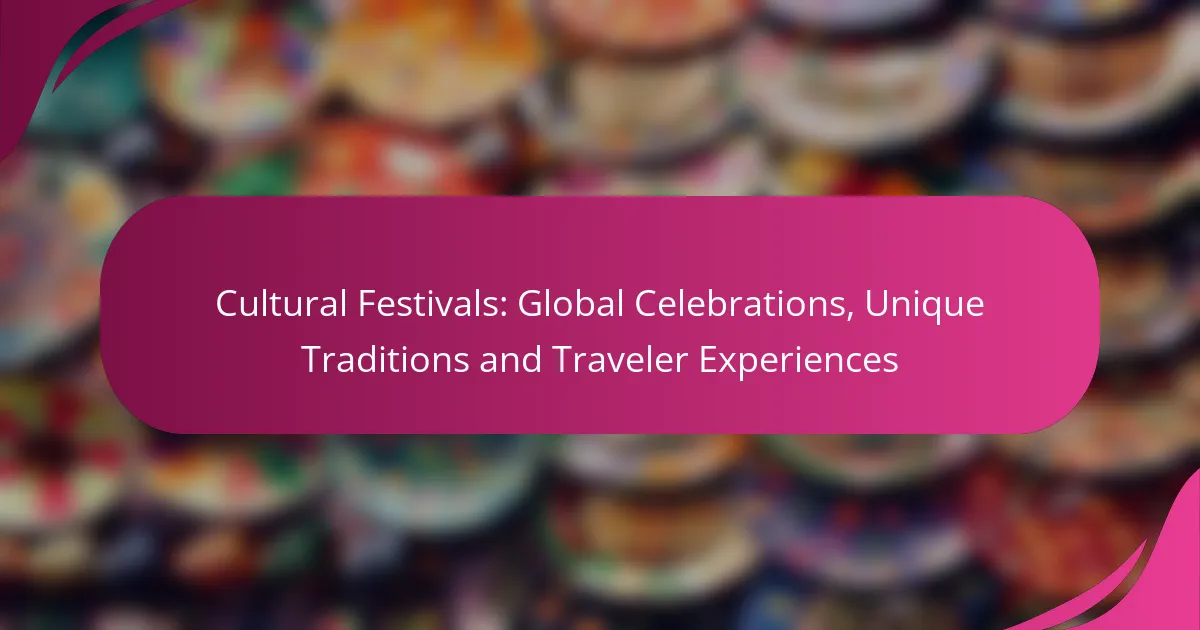Cultural festivals around the globe offer vibrant celebrations that highlight unique traditions and community spirit. From the lively streets of New Orleans during Mardi Gras to the artistic expressions at Burning Man, these events provide travelers with immersive experiences that foster deep connections with local customs and heritage. Engaging in these festivities allows visitors to gain memorable insights into the diverse cultures that shape our world.

What are the most popular cultural festivals in the United States?
The United States hosts a variety of cultural festivals that celebrate unique traditions, art, music, and community spirit. Some of the most popular festivals include Mardi Gras in New Orleans, Burning Man in Nevada, and Coachella in California, each offering distinct experiences and attractions for travelers.
Mardi Gras in New Orleans
Mardi Gras is one of the most famous cultural festivals in the United States, celebrated annually in New Orleans. This vibrant festival features parades, masquerade balls, and street parties, attracting millions of visitors who come to experience the lively atmosphere and rich traditions.
Key elements of Mardi Gras include elaborate floats, colorful costumes, and the iconic throwing of beads and trinkets known as “throws.” The festival typically culminates on Fat Tuesday, the day before Ash Wednesday, marking the end of the Carnival season.
Burning Man in Nevada
Burning Man is a unique cultural festival held in the Black Rock Desert of Nevada, focusing on community, art, and self-expression. This week-long event culminates in the burning of a large wooden effigy, symbolizing the festival’s themes of transformation and renewal.
Participants, known as “Burners,” create a temporary city filled with art installations, performances, and themed camps. The festival emphasizes principles such as radical inclusion and self-reliance, making it a distinctive experience for attendees.
Coachella in California
Coachella is a renowned music and arts festival held annually in Indio, California, attracting music lovers from around the world. The festival features a diverse lineup of artists across various genres, along with art installations and food vendors, creating a vibrant atmosphere.
Coachella typically spans two weekends in April, offering attendees the chance to enjoy performances from both established and emerging artists. The festival is known for its fashion trends and social media presence, making it a cultural phenomenon beyond just music.
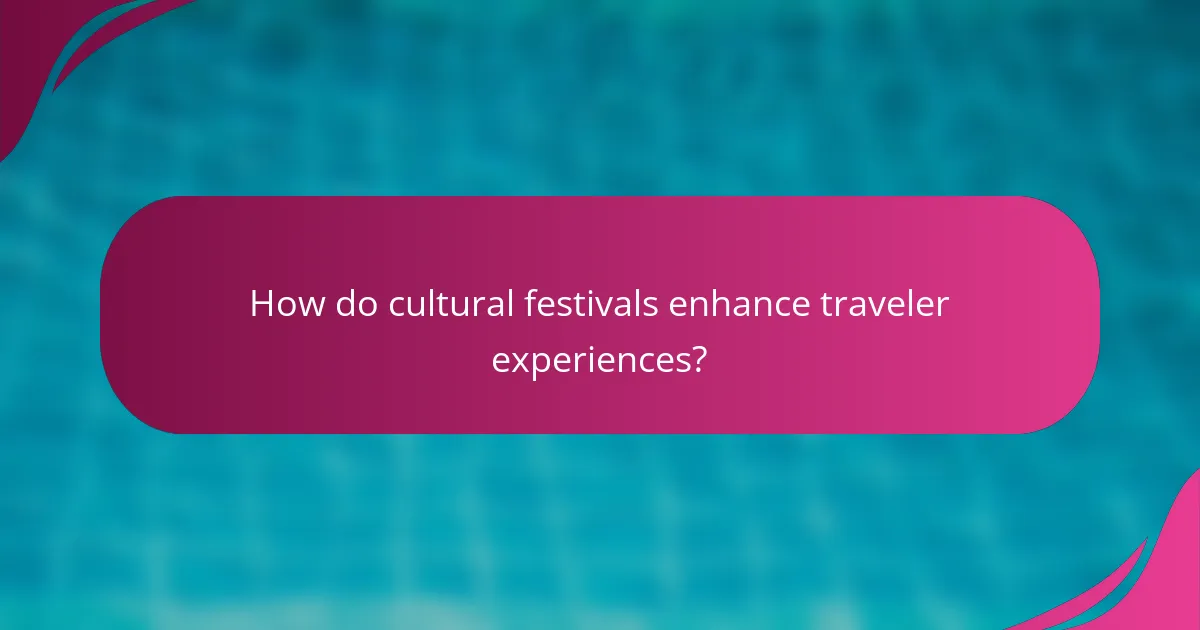
How do cultural festivals enhance traveler experiences?
Cultural festivals significantly enhance traveler experiences by providing immersive opportunities to engage with local customs, traditions, and communities. These events allow visitors to connect deeply with the culture, offering unique insights and memorable interactions that go beyond typical sightseeing.
Immersive local traditions
Participating in cultural festivals allows travelers to witness and engage in local traditions firsthand. For example, during the Diwali festival in India, visitors can join in the lighting of lamps and enjoy traditional music and dance. Such experiences foster a deeper understanding of the culture and create lasting memories.
Travelers should consider joining workshops or guided tours that focus on specific traditions, such as traditional crafts or rituals. This not only enriches their experience but also supports local artisans and communities.
Unique culinary experiences
Cultural festivals often showcase local cuisine, offering travelers a chance to taste authentic dishes that reflect the region’s heritage. For instance, the Oktoberfest in Germany features a variety of traditional beers and foods, such as pretzels and sausages, that are integral to the local culture.
To make the most of culinary experiences, travelers should seek out food stalls or cooking demonstrations during festivals. Engaging with local chefs can provide insights into the preparation and significance of the dishes, enhancing the overall experience.
Networking opportunities with locals
Cultural festivals provide excellent networking opportunities, allowing travelers to meet locals and other visitors. Engaging in conversations during events can lead to friendships and valuable cultural exchanges. For example, many festivals have communal areas where attendees can gather and share stories.
Travelers should be open to initiating conversations and participating in group activities. This approach not only enriches their experience but can also lead to discovering hidden gems and local tips that are not found in guidebooks.
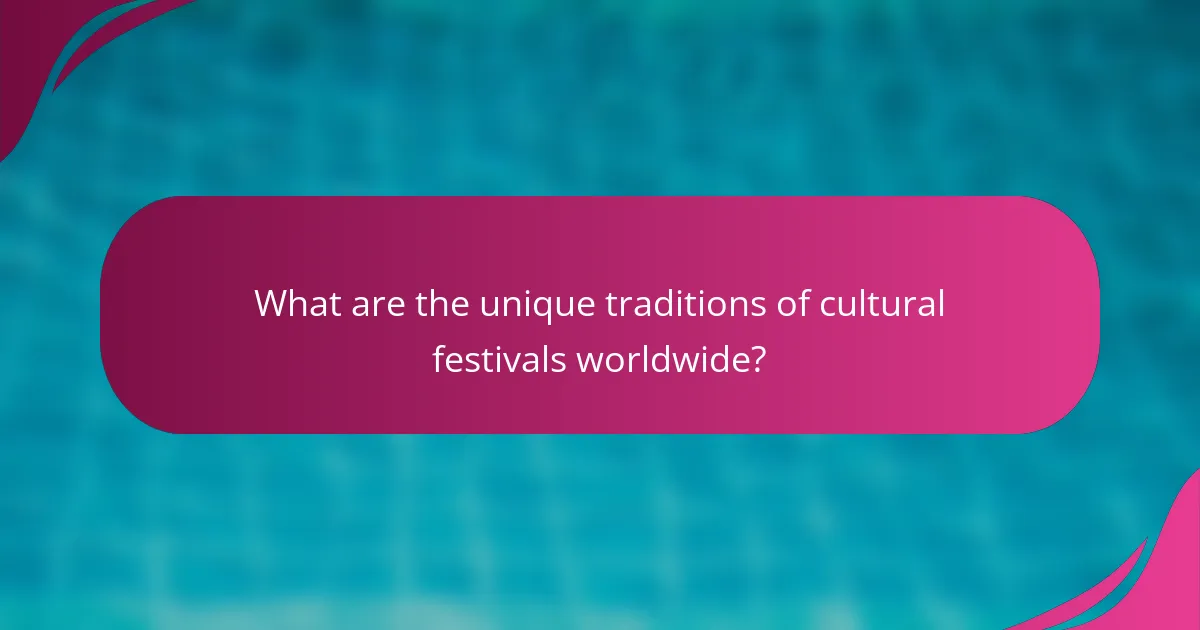
What are the unique traditions of cultural festivals worldwide?
Cultural festivals worldwide showcase unique traditions that reflect the heritage, beliefs, and customs of various communities. These celebrations often include specific rituals, foods, and activities that are deeply rooted in local culture.
Diwali in India
Diwali, known as the Festival of Lights, is celebrated across India and among Indian communities worldwide. It symbolizes the victory of light over darkness and good over evil, marked by lighting oil lamps, decorating homes, and exchanging sweets.
During Diwali, families perform prayers to Lakshmi, the goddess of wealth, and participate in fireworks displays. The festival typically lasts five days, with each day having its own significance and rituals, such as Dhanteras, Naraka Chaturdashi, and Bhai Dooj.
Oktoberfest in Germany
Oktoberfest is a world-famous beer festival held annually in Munich, Germany, attracting millions of visitors. It usually runs from late September to the first weekend in October, celebrating Bavarian culture with traditional music, food, and, of course, beer.
Visitors can enjoy a variety of local dishes like pretzels, sausages, and roast chicken while experiencing lively folk music and dance. The festival features large tents operated by different breweries, each offering their unique brews, making it a vibrant social gathering.
Holi in India
Holi, the Festival of Colors, is celebrated primarily in India and marks the arrival of spring. This joyous festival involves throwing colored powders and water at each other, symbolizing love, joy, and the triumph of good over evil.
Holi is celebrated with music, dance, and festive foods, creating an atmosphere of unity and happiness. The celebration typically lasts for a day, with people gathering in public spaces to partake in the colorful festivities, making it a memorable experience for participants and onlookers alike.
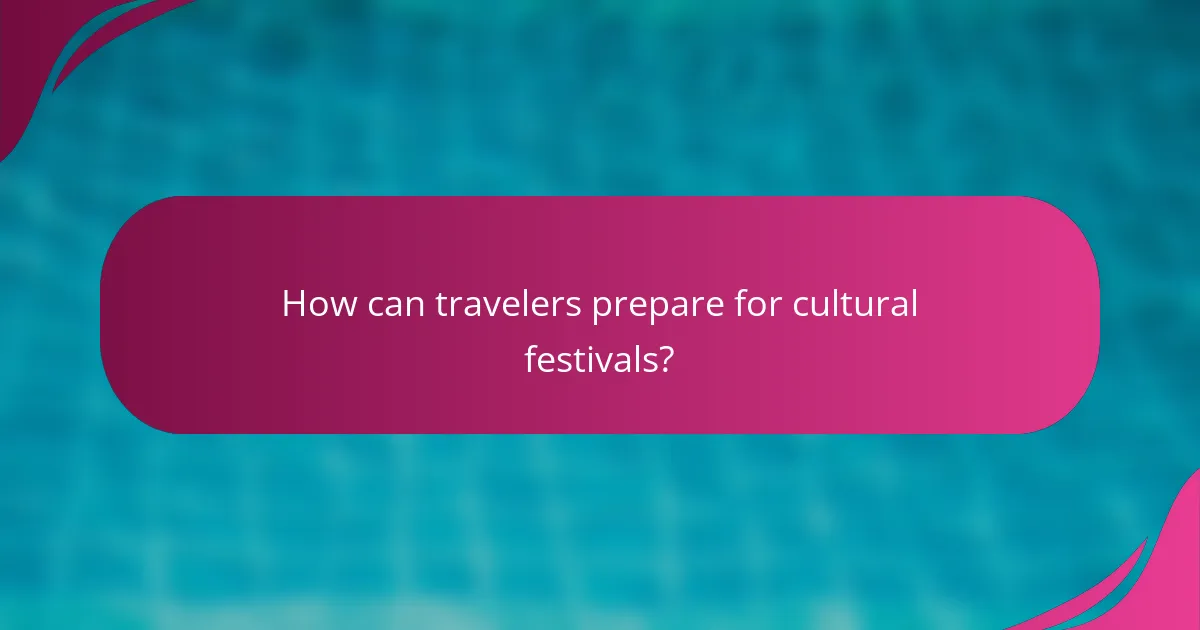
How can travelers prepare for cultural festivals?
Travelers can prepare for cultural festivals by understanding local traditions, securing accommodations in advance, and considering the weather. These steps ensure a more enjoyable and immersive experience during the festivities.
Research local customs
Understanding local customs is crucial for fully appreciating cultural festivals. Each festival has unique traditions, rituals, and etiquette that may differ significantly from what travelers are accustomed to.
For example, some festivals may involve specific dress codes, such as wearing traditional attire or modest clothing. Familiarizing yourself with these customs can enhance your experience and show respect to the local culture.
Book accommodations early
Accommodations can fill up quickly during popular cultural festivals, so booking early is essential. Many travelers flock to these events, leading to increased demand and higher prices as the festival date approaches.
Consider options ranging from hotels to local homestays or hostels. Aim to secure your lodging at least a few months in advance to ensure availability and potentially better rates.
Plan for weather conditions
Weather can significantly impact your festival experience, so it’s wise to plan accordingly. Check the typical climate for the festival’s location during that time of year and prepare for various conditions.
For instance, if attending a festival in a region known for rain, pack waterproof gear and appropriate clothing. Conversely, if the event is in a hot climate, lightweight, breathable fabrics will enhance comfort while enjoying the festivities.
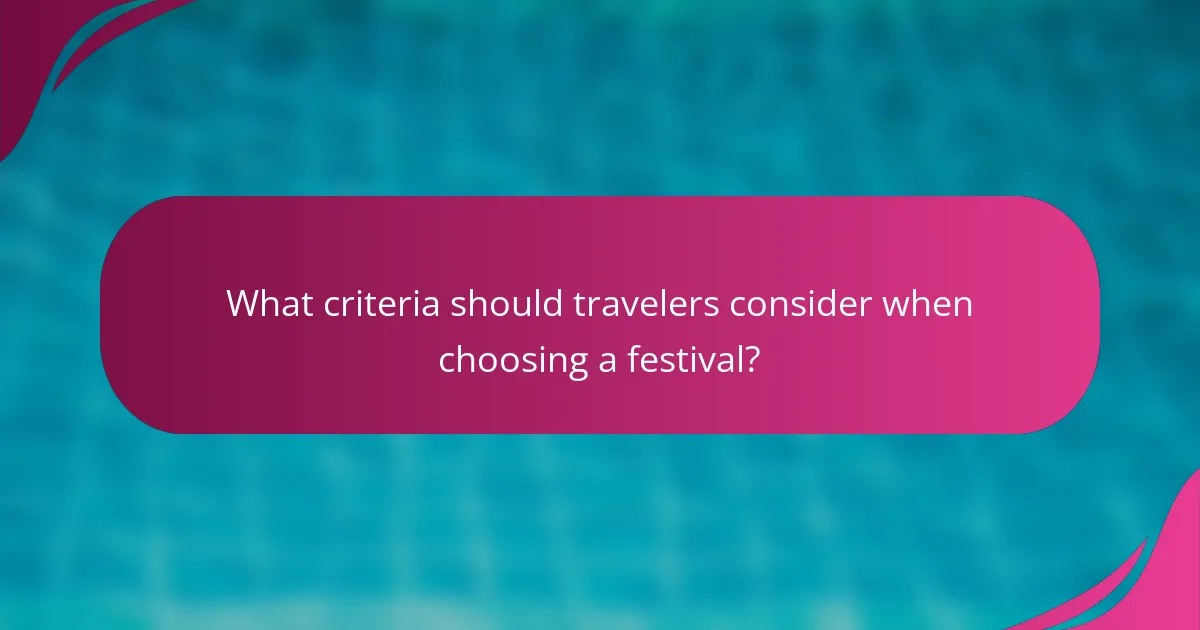
What criteria should travelers consider when choosing a festival?
Travelers should consider festival size, location accessibility, and the type of cultural experience offered when selecting a festival. These factors significantly influence the overall enjoyment and convenience of attending the event.
Festival size and scale
The size and scale of a festival can greatly affect the atmosphere and experience. Larger festivals may offer more activities, performances, and food options, but they can also be crowded and overwhelming. Smaller festivals often provide a more intimate setting, allowing for deeper connections with local culture and community.
When choosing a festival, think about your comfort level with crowds. If you prefer a bustling environment, larger events might be ideal. Conversely, if you enjoy a relaxed pace, seek out smaller, local celebrations.
Location accessibility
Accessibility to the festival location is crucial for a smooth travel experience. Consider the distance from major transportation hubs, availability of public transport, and local accommodations. Festivals in remote areas may require additional planning for travel and lodging.
Check if the festival offers shuttle services or if there are nearby hotels and hostels. Additionally, research local regulations regarding travel, especially if you’re visiting from abroad, to ensure you have the necessary documentation and understand any entry requirements.
Type of cultural experience
The type of cultural experience a festival offers can vary widely, from traditional music and dance to food and art. Identify what aspects of culture interest you most, as this will guide your choice. Some festivals focus on specific themes, such as harvest celebrations or religious observances, while others may highlight regional arts and crafts.
Look for festivals that align with your interests. If you enjoy culinary experiences, seek out food festivals that showcase local cuisine. For those interested in performing arts, consider festivals that feature dance, theater, or music specific to the region.
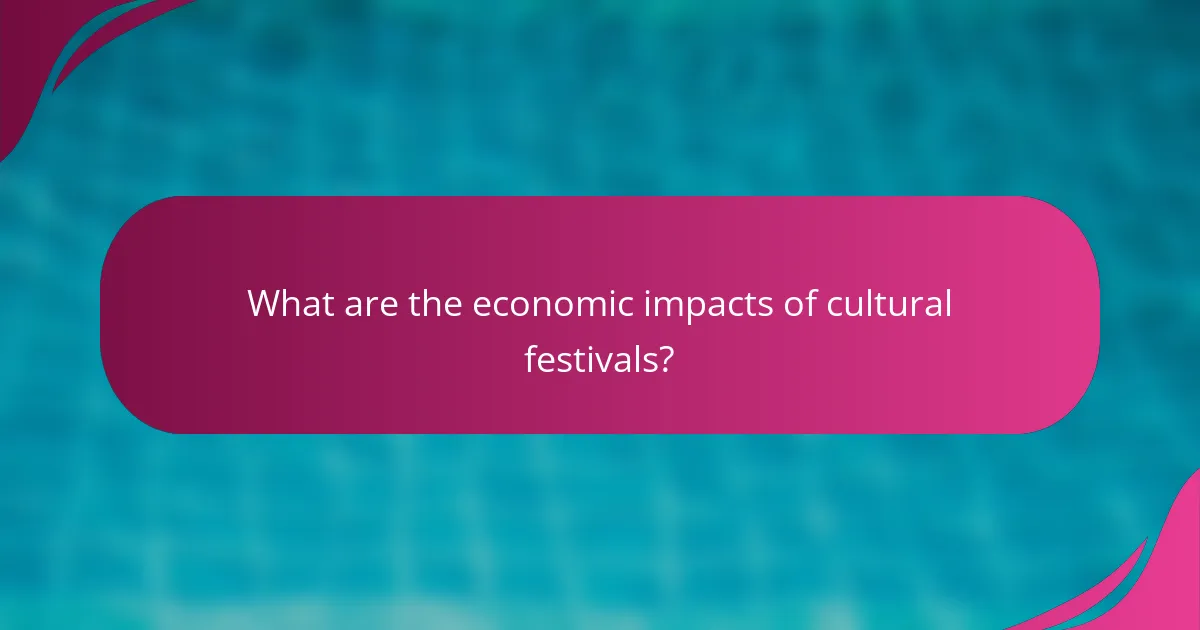
What are the economic impacts of cultural festivals?
Cultural festivals significantly boost local economies by attracting tourists, generating revenue, and creating jobs. These events can lead to increased spending in hospitality, retail, and transportation sectors, benefiting communities and local businesses.
Job Creation
Cultural festivals often lead to job creation in various sectors, including event management, hospitality, and entertainment. Temporary positions may arise in areas such as food service, security, and logistics, providing opportunities for local residents.
In many cases, festivals can stimulate long-term employment by promoting local businesses and attracting repeat visitors. This can result in a more stable job market in the region.
Tourism Revenue
Tourism revenue generated by cultural festivals can be substantial, as visitors spend on accommodations, dining, and local attractions. Festivals can draw thousands of attendees, leading to increased occupancy rates in hotels and higher sales for local restaurants.
For instance, a well-known festival might see visitors spending hundreds of dollars per day, contributing significantly to the local economy. Regions that host multiple festivals throughout the year can experience a steady influx of tourism revenue.
Community Development
Cultural festivals can foster community development by promoting local culture and heritage. They often encourage collaboration among local businesses, artists, and organizations, creating a sense of pride and identity within the community.
Additionally, festivals can lead to infrastructure improvements, as local governments may invest in facilities and services to accommodate increased visitors. This can enhance the overall quality of life for residents.
